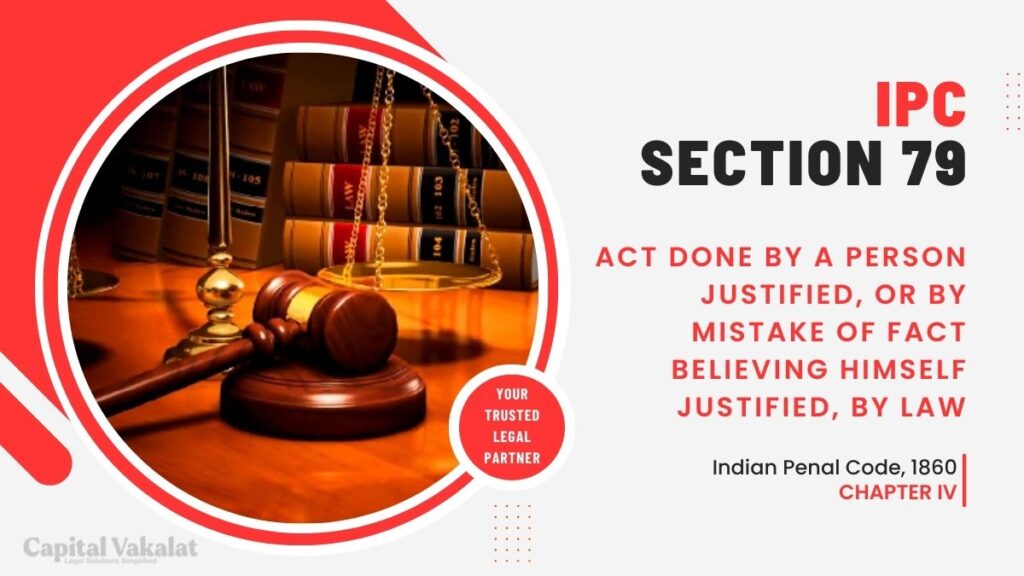In the labyrinth of legal intricacies that constitute the Indian Penal Code (IPC), Section 79 stands as a beacon of understanding the nuances of acts done by a person, either justified by law or due to a sincere but mistaken belief in their justification. This legal provision plays a pivotal role in safeguarding individuals who, in the pursuit of justice or self-defense, find themselves at the crossroads of legality.

In this article, we will dissect Section 79 IPC, shedding light on its implications and the fine line it treads between legality and misjudgment.
Unraveling Section 79 IPC
Introduction to Section 79
Section 79 of the IPC is a crucial legal clause that provides protection to individuals who engage in actions they believe are justified under the law or due to a mistaken belief in the same.
Justification by Law
One of the primary aspects of this section is the concept of “justification by law.” It delves into situations where individuals act in a manner that the law explicitly allows or even mandates.
The Role of Honest Belief
Section 79 also recognizes the significance of an honest belief. It covers instances where a person genuinely believes that their actions are legally justified, even if that belief is later proven to be incorrect.
Legal Context is Crucial
Understanding the specific legal context within which Section 79 operates is essential. This context plays a pivotal role in determining whether an action can be considered justified or not.
Situations Covered by Section 79
Self-Defense
One of the most common scenarios where Section 79 comes into play is in cases of self-defense. It allows individuals to protect themselves when faced with imminent harm.
Protection of Property
The section also extends its protection to individuals acting to safeguard their property, provided they do so within the bounds of the law.
Acts Committed Under Orders
Acts performed under orders from a person in authority, if believed to be lawful, are covered by Section 79.
Mistaken Beliefs and Their Impact
A critical aspect of Section 79 is the examination of mistaken beliefs. It elucidates how a sincere but incorrect belief in the legality of an action can influence the legal outcome.
Real-Life Examples
Case Study: Self-Defense
Consider a situation where an individual defends themselves from an attacker, believing that their life is in danger. Section 79 can be invoked if their belief in imminent harm was genuine.
Protection of Property
If someone uses reasonable force to protect their property, thinking it’s within the boundaries of the law, Section 79 can act as a shield in case their belief is found to be mistaken.
Acts Under Authority
Imagine a scenario where a law enforcement officer mistakenly believes that their superior’s order is lawful. Section 79 provides a layer of protection in such cases.
Legal Precedents and Interpretations
Landmark Cases
Several landmark cases in Indian jurisprudence have dealt with Section 79 IPC, offering valuable insights into its interpretation and application.
Role of Intent
One key aspect often examined in these cases is the intent behind the action. Was the person genuinely convinced of their justification?
Balancing Act
Courts often find themselves performing a delicate balancing act when evaluating Section 79 cases, ensuring that the law’s intent is upheld.
Conclusion
In conclusion, Section 79 of the Indian Penal Code serves as a safeguard for individuals who find themselves in legal quagmires due to acts they believed were justified, whether by law or a sincere but mistaken belief. It is a reminder that the law acknowledges the complexities of human judgment and seeks to strike a balance between justice and legality.
In the complex world of legal provisions, Section 79 IPC emerges as a cornerstone in understanding the fine line between lawful actions and mistaken beliefs. It serves as a reminder that even in the pursuit of justice, the law takes into account the complexities of human judgment and intent.
After all, the pursuit of justice often involves navigating the intricate web of laws and human beliefs, where Section 79 offers a guiding light.
FAQs
What is the significance of an “honest belief” in Section 79 cases?
An honest belief is crucial because it determines whether the person genuinely thought their actions were lawful. If their belief is found to be honest, Section 79 may apply.
Are there any limitations to invoking Section 79 for self-defense?
Yes, the use of force in self-defense must be reasonable and proportionate to the threat faced. Excessive force can negate the protection provided by Section 79.
How can someone prove their honest belief in court?
Proving an honest belief often involves presenting evidence of the person’s state of mind and their understanding of the circumstances at the time of the action.
Is Section 79 an absolute defense in legal cases?
No, Section 79 is not an absolute defense. Its applicability depends on the specific circumstances and the court’s interpretation of the case.